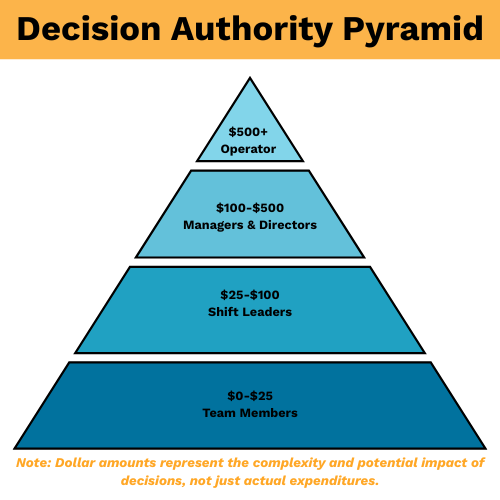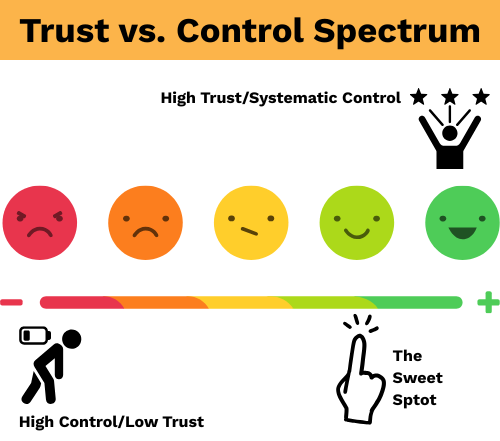Breaking the Mirror Manager Trap: Building Standards That Work Without You
You know that sinking feeling. Everything runs like clockwork when you're in the store, with crisp execution and a smooth flow, meeting standards that would make corporate proud. But the moment you step away for a break, take a day off, or heaven forbid, try to take a vacation, you come back to find things have slipped. Not catastrophically, but enough to notice. Enough to worry.
Welcome to the Mirror Manager Trap, where your presence becomes the only thing reflecting your restaurant's true standards to your team.
If this sounds familiar, you're not alone. It's one of the most common struggles I see among Chick-fil-A Operators, and it's slowly stealing your freedom while exhausting your energy. The good news? It's completely solvable once you understand what's happening and how to fix it.
The Anatomy of Mirror Management
Mirror management happens when your presence becomes the primary driver of performance standards. Like a mirror, when you're there, everything looks perfect; your team reflects your energy, attention to detail, and urgency back at you. But remove the mirror, and there's nothing left to maintain that reflection.
Here's how it typically unfolds:
NOTE: Perhaps you aren’t actually opening and closing the store, but some are. So, consider when you are in the store, whether it’s early in the morning, midday, or late at night.
Morning Setup: When you open, prep is completed on time, stations are properly stocked, and everything is positioned for a smooth day. When someone else opens, you arrive to find missing items, shortcuts taken, and that feeling that you're already behind.
Rush Periods: During your shifts, bottlenecks are addressed quickly, team members naturally support each other, and problems are solved before they escalate. On your days off, the same situations create chaos, finger-pointing, and frustrated guests.
Closing Procedures: Your closing shifts ensure the restaurant is left spotless and properly set up for the next day. Other closing shifts... well, let's say you can tell when you weren't there.
The pattern is clear: your standards exist in your presence, not in your systems.
Why Smart Operators Fall Into This Trap
Mirror management doesn't happen because you're controlling or because your team is lazy. It happens because of three systemic issues that even excellent operators struggle with:
1. Standards Live in Your Head, Not in Systems
You've developed an intuitive sense of what "right" looks like through years of experience. You can spot an improperly portioned sandwich from across the kitchen, or notice when someone's energy is off before it affects performance. This expertise is valuable, but it becomes a liability when it's trapped in your head instead of embedded in teachable, repeatable systems.
2. Team Members Look for Cues Instead of Creating Them
When team members consistently look to you for guidance on priorities, pace, and quality, they become followers rather than leaders. They learn to read your mood and energy, rather than focusing on the operational needs of the restaurant. This creates a dependency that appears to be a sign of respect but limits their growth and your freedom.
3. You've Accidentally Become the System
Over time, your involvement has become the quality control mechanism. Instead of building processes that maintain standards, you've become the process. Your presence triggers higher performance because your team knows you're watching, correcting, and adjusting in real time.
The Hidden Costs of Mirror Management
Beyond the apparent burden of never being able to step away, mirror management creates several hidden costs that compound over time:
Leadership Development Stagnation: When team members only perform at their best under your direct supervision, they fail to develop the internal motivation and decision-making skills necessary for advancement. Your strongest potential leaders remain dependent on your guidance.
Operational Inconsistency: Guest experiences become unpredictable based on your schedule. Mystery shop scores, service times, and quality metrics fluctuate with your presence, creating an unreliable brand experience.
Financial Impact: Inconsistent execution affects everything from labor efficiency to food costs. When standards slip in your absence, waste increases, productivity drops, and guest satisfaction declines.
Personal Burnout: The weight of being the sole driver of excellence is exhausting. You can't maintain peak performance indefinitely, and the pressure of knowing everything depends on you creates unsustainable stress.
The Healthy Tension Alternative
The solution isn't to lower your standards or accept mediocrity in your absence. Instead, it's about creating what I call "healthy tension"—systems that maintain performance pressure without requiring your presence to generate it.
Think of your restaurant like a musical instrument that needs to stay in tune. Mirror management is like constantly tuning the instrument yourself. Healthy tension is like building systems that keep the instrument in tune, whether you're there or not.
This requires shifting from being the standard to being the architect of systems that maintain the standard.
Building Systems That Reflect Standards
1. Create Peer Accountability Networks
Instead of team members looking to you for approval, build systems that enable them to verify each other's work. This distributes the responsibility for maintaining standards across the entire team.
Implementation Example: Before any team member leaves their station, the next person must sign off on the setup. This creates a natural checkpoint system where team members become invested in each other's success.
The Language Shift: Instead of "Did I do this right?" team members ask, "Are you set up for success?" This subtle change moves the focus from approval-seeking to collaboration.
2. Implement Visual Management Systems
Make standards visible and measurable in real time, so team members can self-correct without waiting for your input.
Traffic Light System: Stations use green (flowing smoothly), yellow (building pressure), and red (critical constraint) indicators. This provides everyone with a common language for communicating status and priorities, eliminating the need for interpretation.
Performance Dashboards: Simple displays showing key metrics, such as Speed of Service, Order Accuracy, and OSAT (Overall Satisfaction), allow teams to see their performance impact immediately.
3. Build Decision-Making Authority Levels
Define clear boundaries for what decisions team members can make independently, reducing their dependence on your approval for routine situations.
Decision Matrix Example:
Note: Dollar amounts represent the complexity and potential impact of decisions, not just actual expenditures.
$0-25 impact decisions: Any team member (minor operational adjustments, guest recovery items)
$25-100 impact decisions: Shift leaders (scheduling changes, larger guest issues, minor equipment decisions)
$100-500 impact decisions: Management/Director approval required (major operational changes, significant expenditures)
$500+ impaxct decisions: Operator approval required
This framework empowers team members and leaders to resolve problems efficiently while maintaining effective oversight of significant issues.
4. Establish Consistent Communication Bridges
Information flow between shifts becomes critical when you're not there to connect the dots personally.
Shift Change Protocol: Outgoing team leads spend 5 minutes briefing incoming leads on key information: current bottlenecks, equipment issues, special situations, and priorities for the next shift.
Problem Documentation: Issues that arise get logged with context, actions taken, and outcomes. This fosters organizational learning that is independent of your memory or physical presence.
The Implementation Roadmap
Transitioning from mirror management to systems-driven excellence doesn't happen overnight. Here's a practical approach:
Weeks 1-2: Assessment and Awareness
Document every decision you make during your shifts for one week. You'll be surprised by how many judgments, corrections, and adjustments you make that could be systematized or delegated.
Weeks 3-4: Start with One System
Identify your most significant pain point when you're away and create a simple system to address it. Perhaps it's a matter of opening consistency or rush-hour communication. Focus on getting one thing working reliably.
Weeks 5-8: Expand and Refine
Add additional systems based on what you learned from the first implementation. Pay attention to how team members respond and adjust your approach based on their feedback.
Weeks 9-12: Test and Validate
Deliberately step away during challenging periods to test whether your systems maintain standards without you. Use this data to identify gaps and strengthen areas of weakness.
Overcoming the Trust Barrier
The biggest obstacle to escaping mirror management isn't technical—it's emotional. Letting go of direct control feels risky when your reputation and livelihood depend on consistent execution.
Start Small: You don't have to delegate everything at once. Begin with lower-risk situations and gradually build confidence in your systems.
Measure Everything: Use data to validate that your systems are working. Track the same metrics whether you're present or absent to build confidence in delegated performance.
Celebrate System Wins: When your team handles a challenging situation successfully without your direct involvement, recognize and celebrate it. This reinforces the behavior you want to see and builds confidence in the team’s abilities.
The Freedom Multiplier
When you successfully break the mirror manager trap, something remarkable happens: your standards not only maintain, but they also multiply. Instead of one person caring deeply about excellence, you have an entire team invested in upholding and improving performance.
Your best team members stop waiting for permission to lead and start taking ownership of outcomes. Your operational consistency improves because multiple people are monitoring and maintaining standards. Your stress decreases because the burden of excellence is shared rather than carried alone.
Most importantly, you regain the freedom to work on your business, rather than just in it. You can focus on strategy, development, and growth instead of constantly executing tactical tasks.
Making the Shift
Breaking free from mirror management requires a fundamental shift in how you think about your role. You're not abandoning your standards, you're architecting systems that embody those standards even when you're not there.
Your presence should enhance performance, not enable it. Your team should maintain excellence because the systems demand it, not because you're watching.
The mirror manager trap feels safe because it gives you direct control, but it's the riskiest approach to restaurant operations. True operational security comes from building systems that work regardless of who's running them.
Your restaurant doesn't need you to be present to be excellent; it requires you to be intentional about building excellence into every process, system, and interaction.
That's the difference between being indispensable and being irreplaceable. Indispensable means everything stops without you. Irreplaceable means everything continues because of the systems you built.
Take Action Today: Pick one area where your absence creates the most significant performance gap. Spend 15 minutes designing a simple system that could maintain your standards in that area without requiring your presence. Test it this week and refine based on results.
The goal isn't to make yourself unnecessary; it's to make your excellence sustainable and scalable.
Need Help Breaking Free? If you're struggling to evaluate your current workload, identify which systems to build first, or implement these changes effectively, that's exactly what Operator Solutions Hub specializes in. You could use our Discovery Phase to help identify where you're trapped in operational dependencies and create a clear roadmap to freedom, at no cost to you. Let's have a conversation about how we can help you build the systems that work without you.




